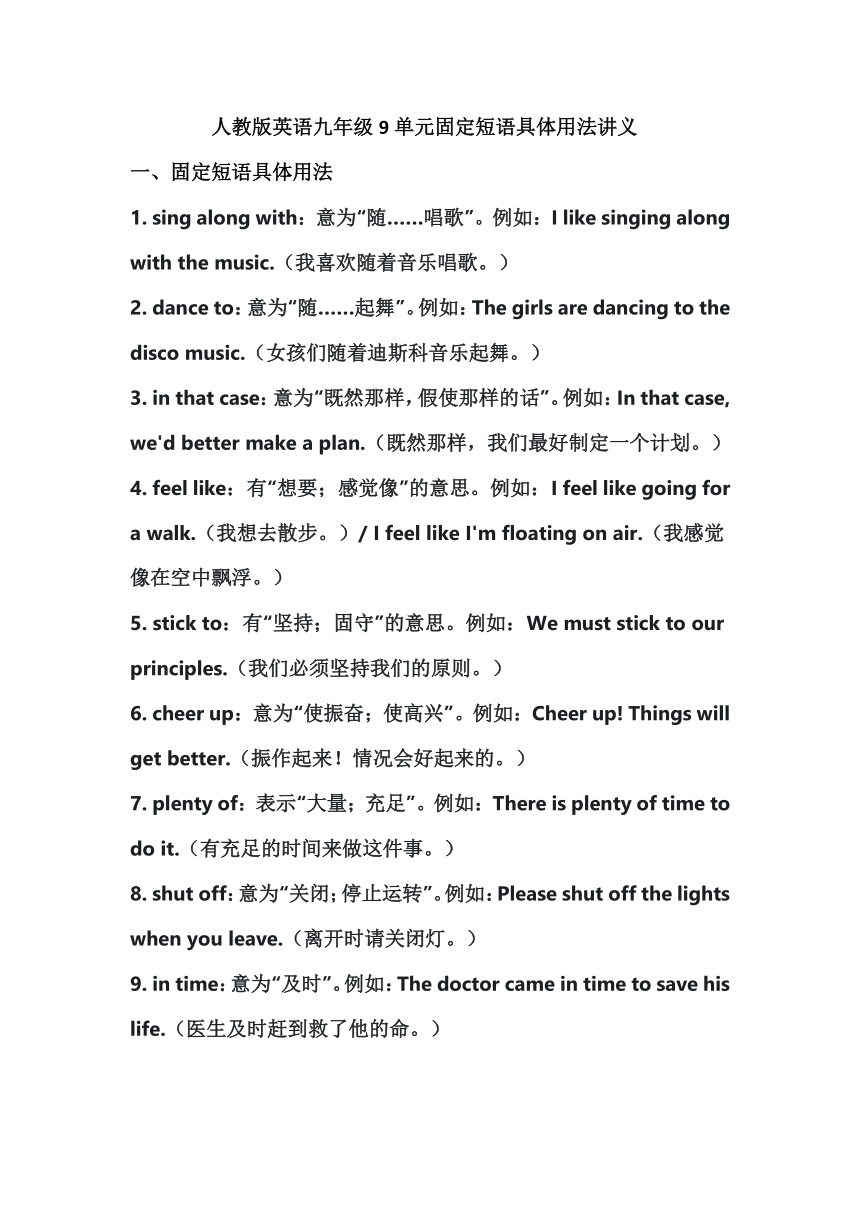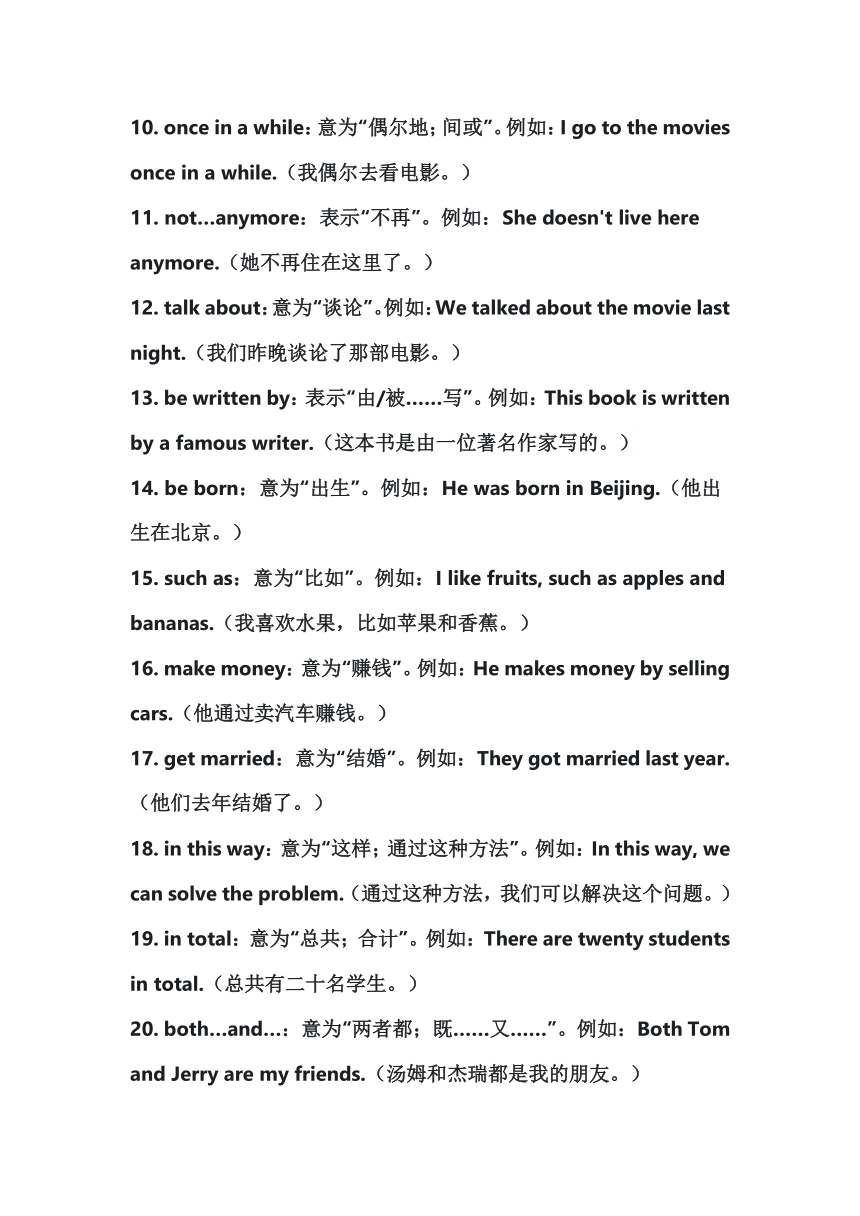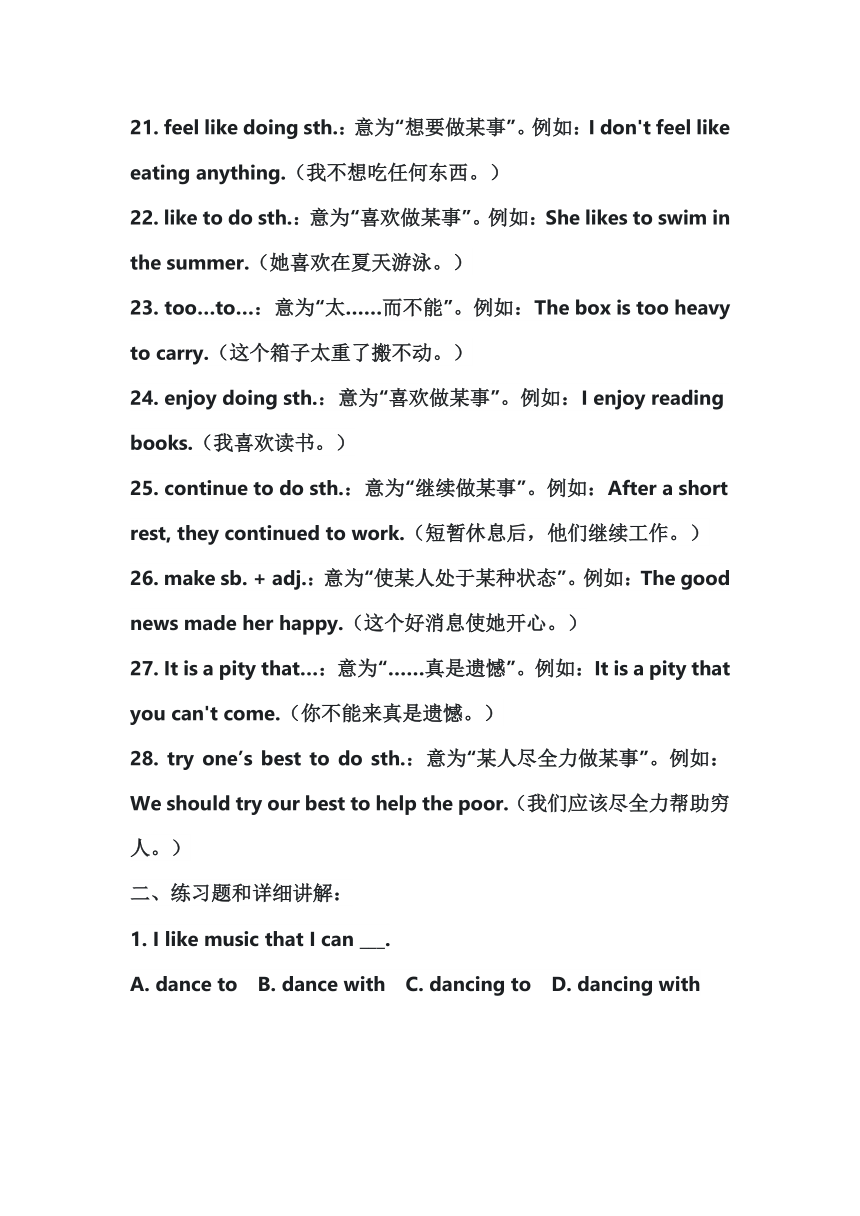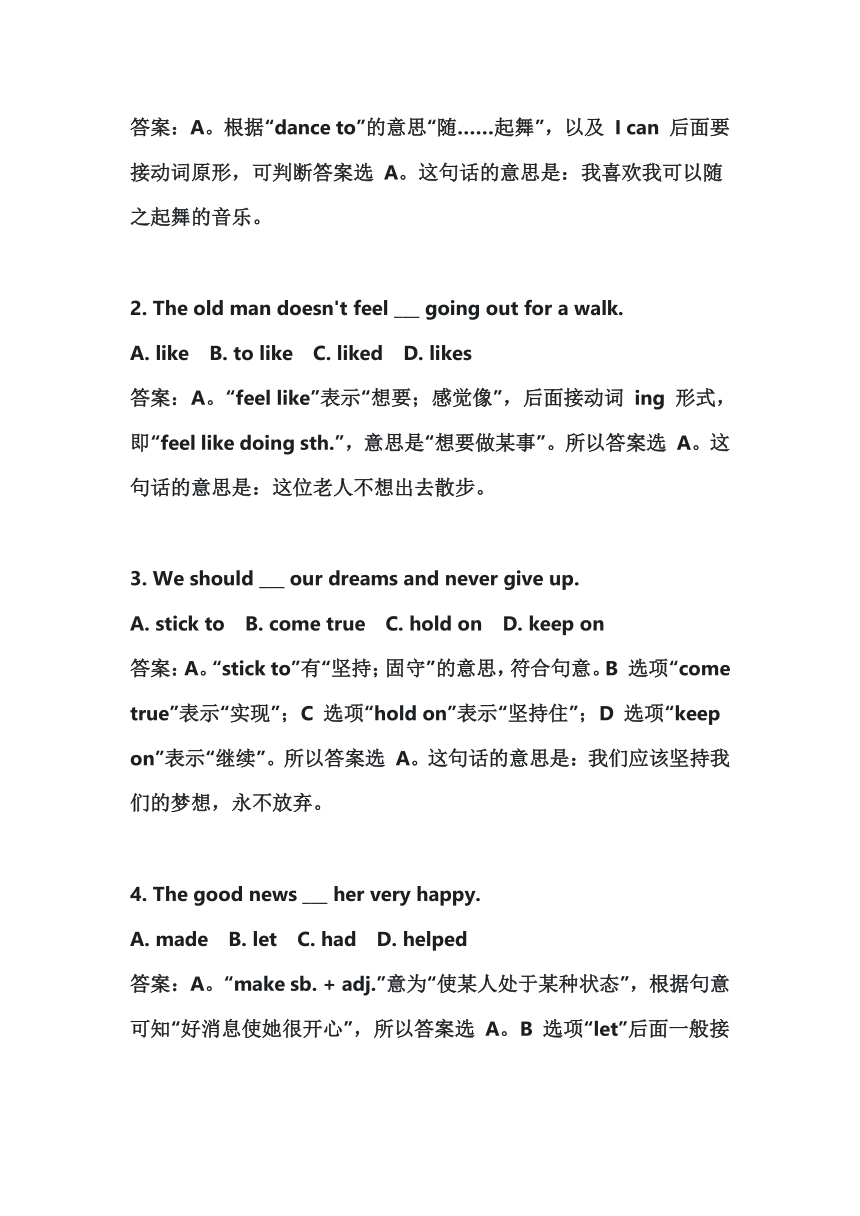Unit 9 I like music that I can dance to.固定短语具体用法讲义
文档属性
| 名称 | Unit 9 I like music that I can dance to.固定短语具体用法讲义 |  | |
| 格式 | docx | ||
| 文件大小 | 20.7KB | ||
| 资源类型 | 教案 | ||
| 版本资源 | 人教新目标(Go for it)版 | ||
| 科目 | 英语 | ||
| 更新时间 | 2024-02-08 08:33:46 | ||
图片预览




文档简介
人教版英语九年级9单元固定短语具体用法讲义
一、固定短语具体用法
1. sing along with:意为“随……唱歌”。例如:I like singing along with the music.(我喜欢随着音乐唱歌。)
2. dance to:意为“随……起舞”。例如:The girls are dancing to the disco music.(女孩们随着迪斯科音乐起舞。)
3. in that case:意为“既然那样,假使那样的话”。例如:In that case, we'd better make a plan.(既然那样,我们最好制定一个计划。)
4. feel like:有“想要;感觉像”的意思。例如:I feel like going for a walk.(我想去散步。)/ I feel like I'm floating on air.(我感觉像在空中飘浮。)
5. stick to:有“坚持;固守”的意思。例如:We must stick to our principles.(我们必须坚持我们的原则。)
6. cheer up:意为“使振奋;使高兴”。例如:Cheer up! Things will get better.(振作起来!情况会好起来的。)
7. plenty of:表示“大量;充足”。例如:There is plenty of time to do it.(有充足的时间来做这件事。)
8. shut off:意为“关闭;停止运转”。例如:Please shut off the lights when you leave.(离开时请关闭灯。)
9. in time:意为“及时”。例如:The doctor came in time to save his life.(医生及时赶到救了他的命。)
10. once in a while:意为“偶尔地;间或”。例如:I go to the movies once in a while.(我偶尔去看电影。)
11. not…anymore:表示“不再”。例如:She doesn't live here anymore.(她不再住在这里了。)
12. talk about:意为“谈论”。例如:We talked about the movie last night.(我们昨晚谈论了那部电影。)
13. be written by:表示“由/被……写”。例如:This book is written by a famous writer.(这本书是由一位著名作家写的。)
14. be born:意为“出生”。例如:He was born in Beijing.(他出生在北京。)
15. such as:意为“比如”。例如:I like fruits, such as apples and bananas.(我喜欢水果,比如苹果和香蕉。)
16. make money:意为“赚钱”。例如:He makes money by selling cars.(他通过卖汽车赚钱。)
17. get married:意为“结婚”。例如:They got married last year.(他们去年结婚了。)
18. in this way:意为“这样;通过这种方法”。例如:In this way, we can solve the problem.(通过这种方法,我们可以解决这个问题。)
19. in total:意为“总共;合计”。例如:There are twenty students in total.(总共有二十名学生。)
20. both…and…:意为“两者都;既……又……”。例如:Both Tom and Jerry are my friends.(汤姆和杰瑞都是我的朋友。)
21. feel like doing sth.:意为“想要做某事”。例如:I don't feel like eating anything.(我不想吃任何东西。)
22. like to do sth.:意为“喜欢做某事”。例如:She likes to swim in the summer.(她喜欢在夏天游泳。)
23. too…to…:意为“太……而不能”。例如:The box is too heavy to carry.(这个箱子太重了搬不动。)
24. enjoy doing sth.:意为“喜欢做某事”。例如:I enjoy reading books.(我喜欢读书。)
25. continue to do sth.:意为“继续做某事”。例如:After a short rest, they continued to work.(短暂休息后,他们继续工作。)
26. make sb. + adj.:意为“使某人处于某种状态”。例如:The good news made her happy.(这个好消息使她开心。)
27. It is a pity that…:意为“……真是遗憾”。例如:It is a pity that you can't come.(你不能来真是遗憾。)
28. try one’s best to do sth.:意为“某人尽全力做某事”。例如:We should try our best to help the poor.(我们应该尽全力帮助穷人。)
二、练习题和详细讲解:
1. I like music that I can ___.
A. dance to B. dance with C. dancing to D. dancing with
答案:A。根据“dance to”的意思“随……起舞”,以及 I can 后面要接动词原形,可判断答案选 A。这句话的意思是:我喜欢我可以随之起舞的音乐。
2. The old man doesn't feel ___ going out for a walk.
A. like B. to like C. liked D. likes
答案:A。“feel like”表示“想要;感觉像”,后面接动词 ing 形式,即“feel like doing sth.”,意思是“想要做某事”。所以答案选 A。这句话的意思是:这位老人不想出去散步。
3. We should ___ our dreams and never give up.
A. stick to B. come true C. hold on D. keep on
答案:A。“stick to”有“坚持;固守”的意思,符合句意。B 选项“come true”表示“实现”;C 选项“hold on”表示“坚持住”;D 选项“keep on”表示“继续”。所以答案选 A。这句话的意思是:我们应该坚持我们的梦想,永不放弃。
4. The good news ___ her very happy.
A. made B. let C. had D. helped
答案:A。“make sb. + adj.”意为“使某人处于某种状态”,根据句意可知“好消息使她很开心”,所以答案选 A。B 选项“let”后面一般接动词原形;C 选项“had”的用法是“have/has/had + 过去分词”;D 选项“help”的用法是“help sb. (to) do sth.”。
5. You'd better ___ the light when you leave the room.
A. turn on B. turn off C. turn up D. turn down
答案:B。“turn on”表示“打开”;“turn off”表示“关闭”;“turn up”表示“调高”;“turn down”表示“调低”。根据句意“当你离开房间时,你最好关灯”,可知答案选 B。
6. There are ___ flowers in the garden.
A. plenty of B. a lot C. a few D. many
答案:A。“plenty of”表示“大量;充足”,可以修饰可数名词和不可数名词;B 选项“a lot”一般不直接修饰名词;C 选项“a few”修饰可数名词,表示“一些”;D 选项“many”修饰可数名词,表示“许多”。根据句意可知,花园里有大量的花,且“flowers”是可数名词复数,故答案选 A。
7. I ___ go to the movies on weekends, but not often.
A. usually B. sometimes C. never D. hardly
答案:B。“sometimes”表示“有时候”,符合题意。A 选项“usually”表示“通常”;C 选项“never”表示“从不”;D 选项“hardly”表示“几乎不”。这句话的意思是:我有时候周末去看电影,但不经常。
8. If you don't work hard, you'll ___ fail the exam.
A. too B. to C. also D. either
答案:B。“too…to…”意为“太……而不能”,根据句意“如果你不努力学习,你将会考试不及格”,可知答案选 B。
9. The book was ___ by a famous writer.
A. written B. wrote C. writing D. writes
答案:A。“be written by”表示“由/被……写”,根据句意“这本书是由一位著名作家写的”,可知答案选 A。
10. She ___ in Shanghai in 1990.
A. is born B. was born C. born D. be born
答案:B。“be born”意为“出生”,句子主语“she”与“bear”之间是被动关系,且根据时间“in 1990”可知,时态为一般过去时,所以答案选 B。
11. We have classes every day ___ Saturday and Sunday.
A. besides B. except C. beside D. except for
答案:B。“except”表示“除……之外”,不包括在整体之内;“besides”表示“除……之外还有……”,包括在整体之内。根据句意“我们除了周六和周日每天都有课”,可知周六和周日不包括在每天都有课这个整体之内,所以答案选 B。C 选项“beside”是“在……旁边”的意思;D 选项“except for”也表示“除……之外”,但是通常用于说明基本情况后,再对细节进行补充。
12. We should help the poor ___ we can.
A. as much as B. as many as C. as far as D. as long as
答案:A。“as much as”表示“尽可能多的”,“the poor”穷人是不可数名词,用“much”修饰。B 选项“as many as”修饰可数名词;C 选项“as far as”表示“就……而言”;D 选项“as long as”表示“只要”。这句话的意思是:我们应该尽可能多地帮助穷人。
13. I will continue ___ my study after graduating from college.
A. to B. with C. in D. /
答案:B。“continue to do sth.”或“continue doing sth.”都可以表示“继续做某事”,“my study”在这里是名词,所以用“continue with”,答案选 B。
14. They ___ talking about the movie last night.
A. enjoy B. enjoys C. enjoyed D. are enjoying
答案:C。根据“last night”可知,句子时态为一般过去时,所以答案选 C。这句话的意思是:他们昨晚很享受谈论那部电影。
15. ___ it is raining hard, we still go to school on time.
A. Because B. If C. Though D. Until
答案:C。“though”引导让步状语从句,意为“尽管”,符合句意。A 选项“because”引导原因状语从句;B 选项“if”引导条件状语从句;D 选项“until”引导时间状语从句。这句话的意思是:尽管雨下得很大,我们仍然按时上学。
一、固定短语具体用法
1. sing along with:意为“随……唱歌”。例如:I like singing along with the music.(我喜欢随着音乐唱歌。)
2. dance to:意为“随……起舞”。例如:The girls are dancing to the disco music.(女孩们随着迪斯科音乐起舞。)
3. in that case:意为“既然那样,假使那样的话”。例如:In that case, we'd better make a plan.(既然那样,我们最好制定一个计划。)
4. feel like:有“想要;感觉像”的意思。例如:I feel like going for a walk.(我想去散步。)/ I feel like I'm floating on air.(我感觉像在空中飘浮。)
5. stick to:有“坚持;固守”的意思。例如:We must stick to our principles.(我们必须坚持我们的原则。)
6. cheer up:意为“使振奋;使高兴”。例如:Cheer up! Things will get better.(振作起来!情况会好起来的。)
7. plenty of:表示“大量;充足”。例如:There is plenty of time to do it.(有充足的时间来做这件事。)
8. shut off:意为“关闭;停止运转”。例如:Please shut off the lights when you leave.(离开时请关闭灯。)
9. in time:意为“及时”。例如:The doctor came in time to save his life.(医生及时赶到救了他的命。)
10. once in a while:意为“偶尔地;间或”。例如:I go to the movies once in a while.(我偶尔去看电影。)
11. not…anymore:表示“不再”。例如:She doesn't live here anymore.(她不再住在这里了。)
12. talk about:意为“谈论”。例如:We talked about the movie last night.(我们昨晚谈论了那部电影。)
13. be written by:表示“由/被……写”。例如:This book is written by a famous writer.(这本书是由一位著名作家写的。)
14. be born:意为“出生”。例如:He was born in Beijing.(他出生在北京。)
15. such as:意为“比如”。例如:I like fruits, such as apples and bananas.(我喜欢水果,比如苹果和香蕉。)
16. make money:意为“赚钱”。例如:He makes money by selling cars.(他通过卖汽车赚钱。)
17. get married:意为“结婚”。例如:They got married last year.(他们去年结婚了。)
18. in this way:意为“这样;通过这种方法”。例如:In this way, we can solve the problem.(通过这种方法,我们可以解决这个问题。)
19. in total:意为“总共;合计”。例如:There are twenty students in total.(总共有二十名学生。)
20. both…and…:意为“两者都;既……又……”。例如:Both Tom and Jerry are my friends.(汤姆和杰瑞都是我的朋友。)
21. feel like doing sth.:意为“想要做某事”。例如:I don't feel like eating anything.(我不想吃任何东西。)
22. like to do sth.:意为“喜欢做某事”。例如:She likes to swim in the summer.(她喜欢在夏天游泳。)
23. too…to…:意为“太……而不能”。例如:The box is too heavy to carry.(这个箱子太重了搬不动。)
24. enjoy doing sth.:意为“喜欢做某事”。例如:I enjoy reading books.(我喜欢读书。)
25. continue to do sth.:意为“继续做某事”。例如:After a short rest, they continued to work.(短暂休息后,他们继续工作。)
26. make sb. + adj.:意为“使某人处于某种状态”。例如:The good news made her happy.(这个好消息使她开心。)
27. It is a pity that…:意为“……真是遗憾”。例如:It is a pity that you can't come.(你不能来真是遗憾。)
28. try one’s best to do sth.:意为“某人尽全力做某事”。例如:We should try our best to help the poor.(我们应该尽全力帮助穷人。)
二、练习题和详细讲解:
1. I like music that I can ___.
A. dance to B. dance with C. dancing to D. dancing with
答案:A。根据“dance to”的意思“随……起舞”,以及 I can 后面要接动词原形,可判断答案选 A。这句话的意思是:我喜欢我可以随之起舞的音乐。
2. The old man doesn't feel ___ going out for a walk.
A. like B. to like C. liked D. likes
答案:A。“feel like”表示“想要;感觉像”,后面接动词 ing 形式,即“feel like doing sth.”,意思是“想要做某事”。所以答案选 A。这句话的意思是:这位老人不想出去散步。
3. We should ___ our dreams and never give up.
A. stick to B. come true C. hold on D. keep on
答案:A。“stick to”有“坚持;固守”的意思,符合句意。B 选项“come true”表示“实现”;C 选项“hold on”表示“坚持住”;D 选项“keep on”表示“继续”。所以答案选 A。这句话的意思是:我们应该坚持我们的梦想,永不放弃。
4. The good news ___ her very happy.
A. made B. let C. had D. helped
答案:A。“make sb. + adj.”意为“使某人处于某种状态”,根据句意可知“好消息使她很开心”,所以答案选 A。B 选项“let”后面一般接动词原形;C 选项“had”的用法是“have/has/had + 过去分词”;D 选项“help”的用法是“help sb. (to) do sth.”。
5. You'd better ___ the light when you leave the room.
A. turn on B. turn off C. turn up D. turn down
答案:B。“turn on”表示“打开”;“turn off”表示“关闭”;“turn up”表示“调高”;“turn down”表示“调低”。根据句意“当你离开房间时,你最好关灯”,可知答案选 B。
6. There are ___ flowers in the garden.
A. plenty of B. a lot C. a few D. many
答案:A。“plenty of”表示“大量;充足”,可以修饰可数名词和不可数名词;B 选项“a lot”一般不直接修饰名词;C 选项“a few”修饰可数名词,表示“一些”;D 选项“many”修饰可数名词,表示“许多”。根据句意可知,花园里有大量的花,且“flowers”是可数名词复数,故答案选 A。
7. I ___ go to the movies on weekends, but not often.
A. usually B. sometimes C. never D. hardly
答案:B。“sometimes”表示“有时候”,符合题意。A 选项“usually”表示“通常”;C 选项“never”表示“从不”;D 选项“hardly”表示“几乎不”。这句话的意思是:我有时候周末去看电影,但不经常。
8. If you don't work hard, you'll ___ fail the exam.
A. too B. to C. also D. either
答案:B。“too…to…”意为“太……而不能”,根据句意“如果你不努力学习,你将会考试不及格”,可知答案选 B。
9. The book was ___ by a famous writer.
A. written B. wrote C. writing D. writes
答案:A。“be written by”表示“由/被……写”,根据句意“这本书是由一位著名作家写的”,可知答案选 A。
10. She ___ in Shanghai in 1990.
A. is born B. was born C. born D. be born
答案:B。“be born”意为“出生”,句子主语“she”与“bear”之间是被动关系,且根据时间“in 1990”可知,时态为一般过去时,所以答案选 B。
11. We have classes every day ___ Saturday and Sunday.
A. besides B. except C. beside D. except for
答案:B。“except”表示“除……之外”,不包括在整体之内;“besides”表示“除……之外还有……”,包括在整体之内。根据句意“我们除了周六和周日每天都有课”,可知周六和周日不包括在每天都有课这个整体之内,所以答案选 B。C 选项“beside”是“在……旁边”的意思;D 选项“except for”也表示“除……之外”,但是通常用于说明基本情况后,再对细节进行补充。
12. We should help the poor ___ we can.
A. as much as B. as many as C. as far as D. as long as
答案:A。“as much as”表示“尽可能多的”,“the poor”穷人是不可数名词,用“much”修饰。B 选项“as many as”修饰可数名词;C 选项“as far as”表示“就……而言”;D 选项“as long as”表示“只要”。这句话的意思是:我们应该尽可能多地帮助穷人。
13. I will continue ___ my study after graduating from college.
A. to B. with C. in D. /
答案:B。“continue to do sth.”或“continue doing sth.”都可以表示“继续做某事”,“my study”在这里是名词,所以用“continue with”,答案选 B。
14. They ___ talking about the movie last night.
A. enjoy B. enjoys C. enjoyed D. are enjoying
答案:C。根据“last night”可知,句子时态为一般过去时,所以答案选 C。这句话的意思是:他们昨晚很享受谈论那部电影。
15. ___ it is raining hard, we still go to school on time.
A. Because B. If C. Though D. Until
答案:C。“though”引导让步状语从句,意为“尽管”,符合句意。A 选项“because”引导原因状语从句;B 选项“if”引导条件状语从句;D 选项“until”引导时间状语从句。这句话的意思是:尽管雨下得很大,我们仍然按时上学。
同课章节目录
- Unit 1 How can we become good learners.
- Section A
- Section B
- Unit 2 I think that mooncakes are delicious!
- Section A
- Section B
- Unit 3 Could you please tell me where the restroom
- Section A
- Section B
- Unit 4 I used to be afraid of the dark.
- Section A
- Section B
- Unit 5 What are the shirts made of?
- Section A
- Section B
- Review of Units 1-5
- Unit 6 When was it invented?
- Section A
- Section B
- Unit 7 Teenagers should be allowed to choose their
- Section A
- Section B
- Unit 8 It must belong to Carla.
- Section A
- Section B
- Unit 9 I like music that I can dance to.
- Section A
- Section B
- Unit 10 You're supposed to shake hands.
- Section A
- Section B
- Review of Units 6-10
- Unit 11 Sad movies make me cry.
- Section A
- Section B
- Unit 12 Life is full of the unexpected
- Section A
- Section B
- Unit 13 We're trying to save the earth!
- Section A
- Section B
- Unit 14 I remember meeting all of you in Grade 7.
- Section A
- Section B
- Review of Units 11-14
